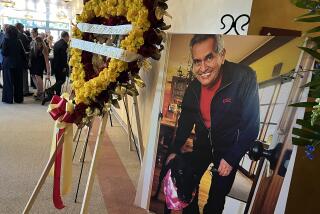Alatorre Admits Former Cocaine Abuse
Los Angeles Councilman Richard Alatorre reluctantly admitted Wednesday, in the most explicit terms he has used publicly, that he is a recovering cocaine addict, although he said he has not used the drug in about nine years.
The lawmaker, in continuing testimony in an acrimonious child guardianship case, was visibly uncomfortable as he was repeatedly questioned about what he generally has characterized as a past alcohol and substance abuse problem.
The Eastside councilman, whose official actions and personal financial matters are part of a wide-ranging federal corruption probe, has been forced to openly discuss the drug issue in recent months. Allegations have surfaced that he abused cocaine with a government contractor and was seen at City Hall and elsewhere with white powder on his nostrils between 1990 and 1995.
Alatorre has strongly denied the accusations, saying that he has been “clean and sober” for a decade. He has dismissed the allegations as those of disgruntled and unreliable individuals, adding that any white residue observed on his nostrils might have been dandruff, denture powder or Doritos.
Superior Court Judge Henry W. Shatford is considering purported financial improprieties and drug use by Alatorre to determine whether the councilman and his wife, Angie, should retain guardianship of their niece.
Near the close of a tedious day reviewing family financial matters Wednesday, attorney Ricardo A. Torres, representing the father of the girl, abruptly shifted to the topic of drug abuse.
Had the councilman told anyone in the last two years about his cocaine use, Torres asked Alatorre.
“I am a recovering alcoholic,” the lawmaker replied.
“Have you ever been addicted to cocaine?” the attorney inquired.
“I’m a recovering alcoholic. That’s what I am,” Alatorre told the court.
At that point, Judge Shatford intervened, instructing the lawmaker not to answer the question in terms of alcohol.
“Yes. I’m an addict, period. I’ll always be a recovering alcoholic and cocaine addict,” the lawmaker responded.
Alatorre said he had begun using the drug 15 or 20 years ago, and stopped about 1989, three years after moving to the City Council from the Legislature.
The testimony was cut short after Alatorre’s attorney, Neil Papiano, objected to a question about whether the lawmaker had paid for the drugs he abused nine years ago. After a 20-minute conference in the judge’s chambers, the hearing recessed for the day. The councilman is scheduled to resume testimony today.
The 10-year-old girl at the center of the guardianship battle has lived with the Alatorres since shortly after her mother’s death in 1996. The girl’s father, longtime Alatorre political rival Henry Lozano, is seeking to prove that the Alatorres are unfit caretakers.
The Alatorres contend that Lozano has shown little or no interest in her well-being and failed to provide any financial support.
Alatorre’s testimony that his drug use ended about nine years ago conflicts with other accounts given in the guardianship case and to federal investigators.
The councilman’s former City Hall secretary, in a sworn statement filed in the case, said she concluded that Alatorre used cocaine based on discussions with his wife, his erratic mood swings and white powder she and other employees saw on his nostrils and in his office bathroom. She did not say in her statement when the incidents occurred.
However, in another sworn statement in the case, a former secretary for a city contractor said it was an open secret that Alatorre frequently visited her boss’ Vernon office to use drugs up to 1994.
Another of the firm’s ex-employees, Donald Benefield, told The Times that he witnessed Alatorre preparing or using cocaine about half a dozen times over a period of several years ending in 1995.
Benefield also said he told the FBI about Alatorre’s alleged cocaine use last year. The relationship between the contractor, Julian G. Carrasco, and Alatorre became part of an investigation into whether Carrasco’s hauling company was improperly dumping hazardous waste. No charges were filed in the dumping case. Carrasco, who described the lawmaker as a longtime, loyal friend, acknowledged to The Times that he used cocaine in the past, but “never with anyone other than myself.”
It is unclear what, if any, information gathered in the waste dumping probe has been cycled into the current corruption investigation of Alatorre, who has said he has done nothing wrong. The probe involves the FBI, Internal Revenue Service and MTA inspector general, working with federal prosecutors.
More to Read
Sign up for Essential California
The most important California stories and recommendations in your inbox every morning.
You may occasionally receive promotional content from the Los Angeles Times.











